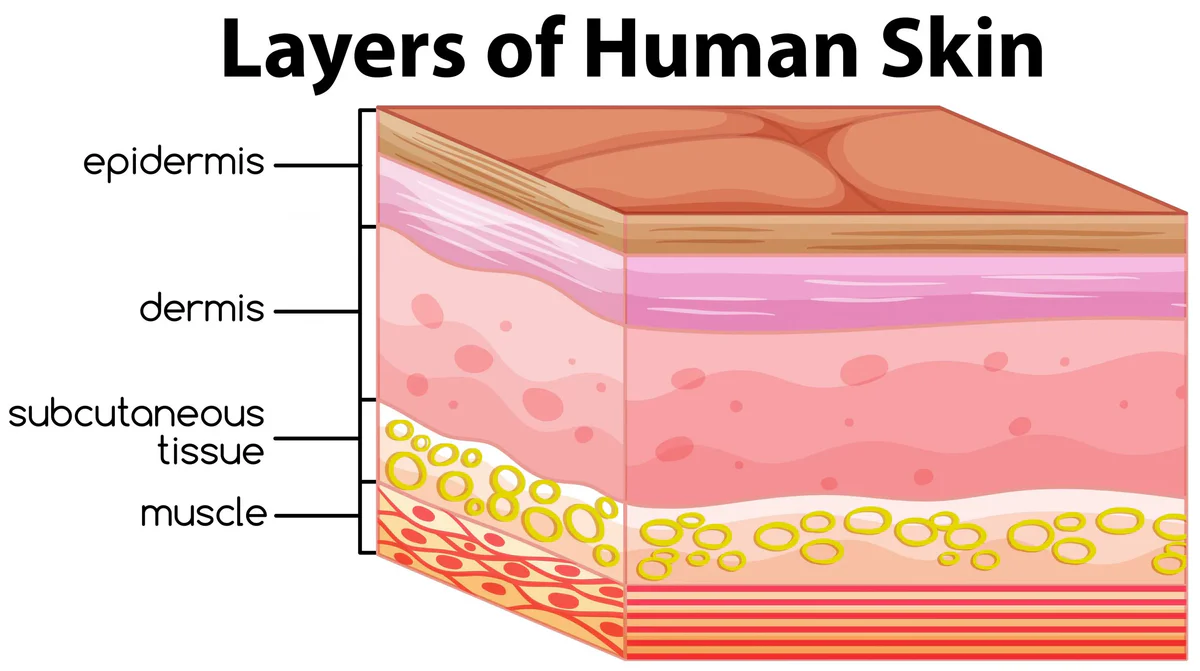Understanding the Epidermis: The Outer Shield
The epidermis, the outermost layer of our skin, acts as a formidable shield against external aggressors. Comprised of multiple layers, this protective barrier defends against harmful UV radiation, pathogens, and environmental pollutants. It’s crucial to comprehend the intricate structure of the epidermis to appreciate its vital role in maintaining skin health.
Layers of the Epidermis
- Stratum Corneum: The outermost layer, consisting of dead skin cells, serves as a waterproof barrier, preventing moisture loss and protecting against infection.
- Stratum Lucidum: Present only in thick skin areas like the palms and soles, this translucent layer provides additional protection and resilience.
- Stratum Granulosum: Responsible for producing lipids and keratin, this layer is pivotal in skin hydration and barrier function.
- Stratum Spinosum: Composed of living keratinocytes, this layer provides structural support and contributes to the skin’s overall strength.
- Stratum Basale (Basal Layer): The deepest layer of the epidermis houses melanocytes, responsible for melanin production, which protects against UV radiation.
The Dermis: Nurturing Support
Beneath the epidermis lies the dermis, a dense connective tissue rich in blood vessels, nerve endings, and appendages essential for skin health.
Components of the Dermis
- Papillary Dermis: The upper layer of the dermis contains papillae that intertwine with the epidermis, facilitating nutrient exchange and enhancing grip.
- Reticular Dermis: Comprising dense, collagen-rich fibers, this deeper layer provides structural support, elasticity, and resilience to the skin.
Delving Deeper: The Subcutaneous Tissue

Beneath the dermis lies the subcutaneous tissue, also known as the hypodermis, consisting of adipose tissue and connective fibers.
Functions of the Subcutaneous Tissue
- Insulation: Adipose tissue acts as an insulating layer, regulating body temperature and providing cushioning against external forces.
- Energy Storage: Fat cells store energy as triglycerides, serving as a reserve for metabolic needs.
- Shock Absorption: The subcutaneous layer absorbs mechanical shocks, protecting internal organs and structures from trauma.
Unveiling the Functions of Skin
Beyond its protective role, the skin serves many essential functions crucial for our survival and quality of life.
Regulation of Body Temperature
The skin acts as a dynamic thermostat, regulating body temperature through processes like sweating and vasodilation. Sweat glands release moisture, which evaporates to cool the body during periods of elevated temperature, while blood vessels dilate to dissipate heat and constrict to conserve warmth in colder environments.
Sensory Perception
Embedded within the skin are millions of sensory receptors that detect various stimuli, including touch, pressure, pain, and temperature. These receptors transmit signals to the brain, enabling us to perceive and respond to our surroundings effectively.
Synthesis of Vitamin D
Exposure to sunlight triggers the synthesis of vitamin D in the skin, a vital nutrient essential for calcium absorption, bone health, and immune function. Adequate sunlight exposure is crucial for maintaining optimal vitamin D levels and overall well-being.
Immune Defense
The skin serves as a robust barrier against pathogens, preventing microbial invasion and infection. Additionally, specialized immune cells within the skin, such as Langerhans cells and T lymphocytes, play pivotal roles in immune surveillance and response, safeguarding the body against external threats.
Skin Health: Tips for Optimal Care
Maintaining healthy skin requires a holistic approach encompassing proper skincare practices, nutrition, hydration, and lifestyle habits.
Skincare Routine
Establishing a consistent skincare routine tailored to your skin type and concerns is essential for promoting skin health. This includes cleansing, exfoliating, moisturizing, and applying sunscreen to protect against UV damage.
Balanced Diet
Consuming a nutrient-rich diet abundant in vitamins, minerals, antioxidants, and essential fatty acids supports skin health from within. Incorporate plenty of fruits, vegetables, whole grains, lean proteins, and healthy fats into your daily meals to nourish your skin and enhance its radiance.
Hydration
Maintaining adequate hydration is crucial for skin health, as water helps flush out toxins, regulate temperature, and maintain skin elasticity. Aim to drink plenty of water throughout the day and limit intake of dehydrating beverages like alcohol and caffeine.
Sun Protection
Shielding your skin from harmful UV radiation is paramount for preventing premature aging, sunburn, and skin cancer. Apply broad-spectrum sunscreen with an SPF of 30 or higher daily, wear protective clothing, and seek shade during peak sun hours to minimize sun damage.
Stress Management
Chronic stress can take a toll on skin health, exacerbating conditions like acne, eczema, and psoriasis. Incorporate stress-relieving activities into your daily routine, such as meditation, yoga, deep breathing exercises, or spending time in nature, to promote overall well-being and skin vitality.
Advanced Skincare Techniques
Elevate your skincare regimen with advanced techniques and treatments designed to target specific skin concerns and enhance overall complexion.
Incorporate Serums and Treatments
Integrate potent serums and targeted treatments into your skincare routine to address specific concerns such as fine lines, wrinkles, hyperpigmentation, and acne. Look for formulations containing ingredients like retinol, vitamin C, hyaluronic acid, niacinamide, and alpha hydroxy acids (AHAs) to deliver visible results and improve skin texture and tone.
Professional Treatments
Consider undergoing professional skincare treatments performed by licensed estheticians or dermatologists to address more complex skin issues and achieve optimal results. Options include chemical peels, microdermabrasion, laser therapy, microneedling, and dermal fillers, tailored to your individual needs and goals.
Facial Massage and Lymphatic Drainage
Incorporate facial massage techniques and lymphatic drainage exercises into your skincare routine to promote circulation, lymphatic flow, and overall skin health. These gentle massage movements help reduce puffiness, improve skin tone, and enhance product absorption, revealing a radiant and rejuvenated complexion.
Holistic Approaches to Skin Wellness
Embrace holistic approaches to skin wellness that prioritize the interconnectedness of body, mind, and spirit, fostering harmony and balance for overall health and vitality.
Mindfulness and Self-Care
Practice mindfulness and self-care rituals to cultivate inner peace, reduce stress, and promote emotional well-being, all of which contribute to healthy, glowing skin. Engage in activities such as meditation, journaling, aromatherapy, or spending time in nature to nurture your soul and enhance skin radiance.
Ayurveda and Traditional Medicine
Explore ancient healing modalities like Ayurveda, Traditional Chinese Medicine (TCM), and herbal remedies, which offer holistic approaches to skin health rooted in centuries-old wisdom. Incorporate herbs, botanicals, and adaptogenic supplements into your wellness routine to support skin regeneration, balance, and vitality from within.
Environmental Awareness
Raise awareness about environmental factors that impact skin health, such as pollution, climate change, and lifestyle choices. Adopt eco-friendly practices, minimize exposure to toxins, and prioritize sustainable skincare products to protect both your skin and the planet.
Empowering Skin Education and Advocacy

Empower yourself and others with knowledge about skin health, skincare ingredients, and industry trends, fostering informed decision-making and advocacy for safe and effective skincare practices.
Education and Research
Stay informed about the latest advancements in skincare science, research studies, and clinical trials to make educated choices about skincare products and treatments. Consult reputable sources, skincare experts, and peer-reviewed journals to deepen your understanding and expand your skincare knowledge base.
Consumer Advocacy
Advocate for transparency, accountability, and inclusivity within the skincare industry, demanding truthful labeling, ethical sourcing, and diverse representation. Support brands that prioritize sustainability, social responsibility, and consumer safety, driving positive change in the beauty landscape.
Conclusion: Empowering Skin Health for All
In conclusion, embracing a comprehensive approach to skin health involves integrating advanced skincare techniques, holistic wellness practices, and informed advocacy to nurture radiant and resilient skin for all. By prioritizing self-care, environmental awareness, and skin education, we can empower ourselves and others to achieve optimal skin health and well-being.
